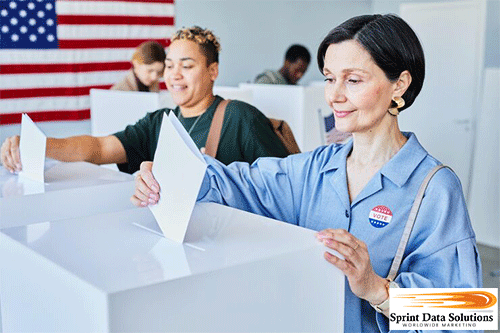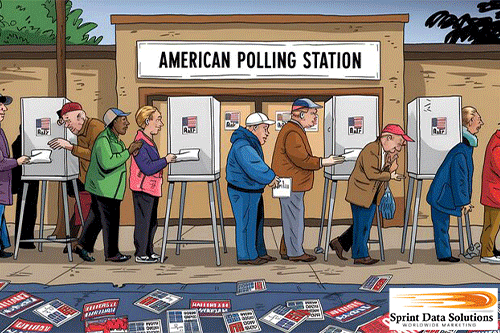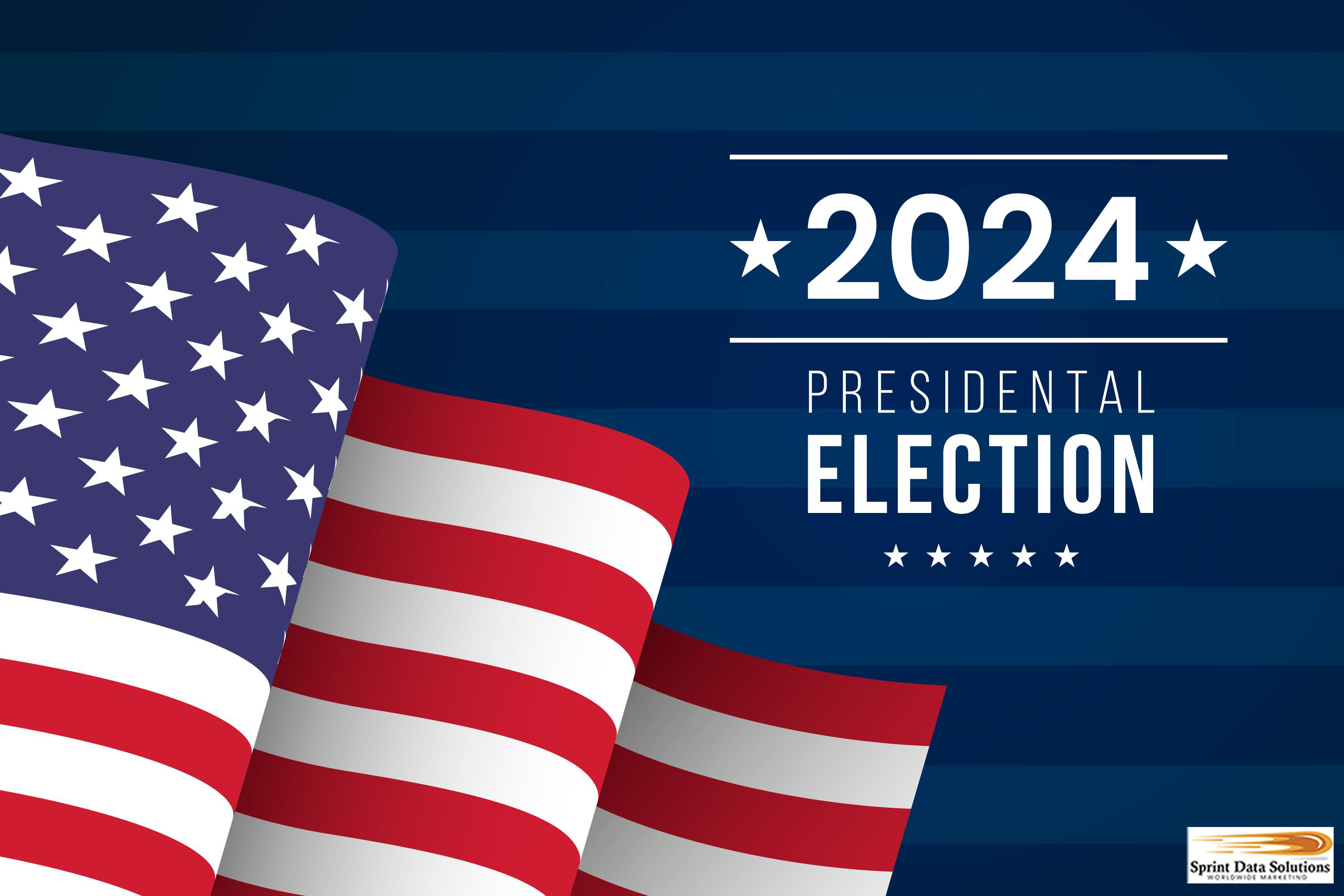Registered Voter Mailing List
The United States stands as one of the few nations that, since its founding, has embraced democracy as its core governing principle. From the very beginning, the country was designed to empower its citizens with the ability to choose their leaders through a representative democracy. This democratic process is deeply embedded in the fabric of American society, manifesting itself at every level of government—local, county, state, and national. Whether it’s electing a mayor, a governor, members of Congress, or the President, Americans have consistently exercised their right to vote and influence the direction of their government. Unlike many other countries where governance might have evolved from monarchies, authoritarian regimes, or other non-democratic systems, the United States has maintained its commitment to a system where the power lies in the hands of the people. This enduring tradition of citizen participation in governance is a defining characteristic of the American political landscape, ensuring that every level of government is accountable to the electorate. The ability of Americans to shape their leadership and policy decisions through regular, free, and fair elections is a cornerstone of the nation’s identity, setting it apart as a beacon of democracy in the world.
As a result, the democratic process in the United States revolves around elections, a complex and extensive undertaking that includes campaigns designed to inform the public and introduce candidates. These candidates then engage with voters, presenting their platforms and explaining why they are the best choice for the position they seek. Following the campaign period, the election takes place, during which citizens have the option to cast their votes either by going to a polling place on the designated day or by submitting their ballots via mail. The United States has evolved beyond the days when voting required physical presence at a polling station within specific hours. This shift has enhanced the inclusivity of the electoral process, enabling those with mobility challenges or other restrictions to participate fully in the democratic process through mail-in voting. Similarly, individuals whose work schedules might prevent them from voting during traditional hours are now able to exercise their right to vote without compromising their jobs or well-being. This expansion of voting methods ensures that the voices of a broader segment of the population are heard, reinforcing the principles of democracy by making it easier for every eligible voter to participate in the election process.
The democratic process in the United States is a continuous endeavor. While the nation may currently be “between elections” concerning the Presidential race, the democratic machinery never truly rests. Local, county, and state elections are constantly taking place, ensuring that governance at all levels remains dynamic and responsive to the will of the people. Meanwhile, preparations for the next national election are already beginning to take shape. The major political parties are gearing up for another round of intense campaigning, with their vast networks and resources mobilizing to sway public opinion and secure votes. At the same time, independent candidates are also gearing up to make their voices heard and participate in the democratic process. This ongoing cycle of elections and campaigns underscores the perpetual nature of democracy in the United States, where the work of governance and representation is never truly complete, but always evolving in response to the needs and desires of the electorate.
Sprint Data Solutions Worldwide Marketing has a long history of collaborating with political organizations to ensure that the democratic process remains robust and effective. Over the years, the company has played a vital role in helping campaigns reach their target audiences, providing crucial data that enables political candidates and organizations to connect with voters in meaningful ways. As the nation gears up for the next election cycle, Sprint Data Solutions Worldwide Marketing is once again ready to assist. With a deep understanding of the complexities involved in modern political campaigns, the company is equipped to support both established parties and independent candidates. By offering detailed voter lists, demographic insights, and targeted marketing strategies, Sprint Data Solutions Worldwide Marketing helps political organizations maximize their outreach efforts, ensuring that their messages resonate with the right audiences. This commitment to supporting the democratic process underscores the company’s dedication to facilitating informed and engaged participation in elections at every level.
About Sprint Data Solutions Worldwide Marketing
Sprint Data Solutions Worldwide Marketing is the realization of a vision by a disabled veteran who founded, owns, and operates this fully American-based company. After dedicating years to military service and making personal sacrifices to defend the nation, the founder sought to transition from the battlefield to the boardroom, focusing on a new mission: fostering economic growth within the country. The goal was to contribute to the nation’s prosperity by empowering businesses—vital engines of the economy—to expand their reach and increase revenues by growing their customer base. Choosing Las Vegas as the starting point, the company began as a modest, local enterprise. Through a commitment to delivering exceptional results, Sprint Data Solutions Worldwide Marketing quickly gained a reputation for excellence, leading to significant growth. Today, the company is proud to have a dedicated team with over 50 years of combined experience in the marketing and promotions industry. This wealth of knowledge and expertise allows Sprint Data Solutions Worldwide Marketing to provide cutting-edge strategies and services to businesses of all sizes, helping them to thrive in a competitive marketplace while continuing to contribute to the economic fabric of the nation.
Sprint Data Solutions Worldwide Marketing began its journey in the marketing industry with a focus on direct mail marketing, a discipline that was pivotal long before the advent of digital marketing. Direct mail shared key characteristics with modern digital strategies, such as precision targeting and personalized outreach. By honing their expertise in direct mail, the company built an extensive repository of database resources, including detailed organizational assets such as names, mailing addresses, and specific demographic metrics. These assets enabled clients to execute highly targeted marketing campaigns with greater accuracy, driving positive outcomes and contributing to the company’s steady growth.
This success allowed Sprint Data Solutions Worldwide Marketing to expand its operations beyond its Las Vegas, Nevada base, eventually covering the entire continental United States. As demand continued to grow, the company extended its reach to include Alaska and Hawaii, achieving full national coverage. The expansion didn’t stop there; Sprint Data Solutions Worldwide Marketing further broadened its services to encompass the entire North American market, including Canada and Mexico.
As the company continued to evolve, it set its sights on international markets, helping clients expand their reach across the globe. The company’s expertise now extends beyond North America, allowing businesses to enter and thrive in international markets, including major economies within the European Union, such as France. This global expansion reflects Sprint Data Solutions Worldwide Marketing’s commitment to providing comprehensive, data-driven marketing solutions that empower businesses to connect with their target audiences, both domestically and internationally, ensuring they can compete and succeed on a global stage.

Elections Are Different In The New Millennium
The democratic process, particularly the methods by which candidates engage with voters, has undergone significant transformation over the years, especially with the rise of the Internet and social media. These digital platforms have introduced new strategies and tools for campaigning, challenging the relevance of traditional media outlets like television, radio, and print. Despite these changes, the fundamental objectives of political campaigns remain consistent. Whether the election is at the local, state, or national level, candidates must still focus on persuading voters that they are the best choice for the office they seek. This persuasion now often involves a combination of traditional outreach methods and modern digital tactics, such as targeted social media campaigns, email outreach, and online advertisements. As the political landscape continues to evolve, candidates must navigate a complex mix of old and new paradigms to effectively connect with and win the support of the electorate.
To achieve this, candidates must first establish their legitimacy, demonstrating both personal integrity and professional qualifications that make them suitable for the office they seek. It involves articulating their stance on key issues, clearly outlining the platforms they endorse, and building trust with voters. Most crucially, candidates must convey their vision for the future by making credible promises about the changes they intend to implement if elected. This includes detailing how they plan to use their authority to influence policy and address the concerns of their constituents. Effective campaigning requires not only presenting a compelling narrative about their ability to lead but also offering tangible solutions that resonate with voters’ needs and aspirations. By combining a strong personal character with a clear, actionable agenda, candidates can build the trust and confidence necessary to secure electoral support.
The methods for achieving campaign goals have evolved significantly over the years. In the early days, before the advent of mass communication, campaigns were centered on personal visits to key election areas, where candidates would deliver speeches and engage directly with voters. These visits were often supported by print materials such as posters, pamphlets, and flyers, which provided additional information and helped to spread the candidate’s message.
With the introduction of radio, the landscape of political campaigning expanded dramatically. Radio allowed candidates to reach a much broader audience with their speeches and interviews, transcending the limitations of geographic boundaries and personal appearances. This development marked a significant shift in how campaigns were conducted, as the spoken word could now influence voters across entire regions.
The advent of television brought another revolution in campaign strategies. Television added a visual dimension to political messaging, making the candidate’s appearance, demeanor, and body language critical factors in public perception. This era introduced political advertisements on broadcast TV, which became a powerful tool for shaping voter opinions. Televised speeches, interviews, and debates became essential components of modern campaigning, providing candidates with a platform to reach millions of viewers simultaneously and allowing voters to assess candidates in real-time.
As each new communication medium emerged, the approach to campaigning adapted, incorporating new technologies while retaining elements of traditional strategies. This continuous evolution reflects the dynamic nature of political campaigns, which must constantly innovate to effectively connect with voters in an ever-changing media landscape.
The rise of the Internet has once again transformed the landscape of political campaigning, introducing new levels of precision and customization in targeted marketing. The Internet’s unparalleled capacity to capture and analyze vast amounts of data has revolutionized how campaigns understand and reach voters. Today, individuals create detailed digital footprints through their online activities—such as creating social media accounts, joining memberships, subscribing to newsletters, and browsing websites. These activities generate rich profiles that reveal preferences, interests, and behaviors, allowing campaigns to tailor their messages with unprecedented accuracy.
This wealth of data is often shared among various organizations and political groups, enabling a more strategic approach to voter engagement. Campaigns can now deploy highly targeted ads, tailored messages, and personalized outreach efforts that resonate deeply with specific voter segments. The shift from traditional media to online platforms has also fundamentally changed the way content is consumed. Unlike the era of radio and television, where audiences were tied to specific broadcast times and channels, the Internet allows for on-demand access to information. Voters can now engage with campaign content at their convenience, whether through streaming videos, reading articles, or participating in online forums, as long as they have access to an Internet-enabled device like a smartphone or computer.
This flexibility has made it easier for campaigns to maintain a continuous presence in voters’ lives, ensuring that their messages can be revisited and shared widely across digital platforms. The Internet has not only expanded the reach of political messaging but has also empowered voters to engage with content in more meaningful ways, shaping a more interactive and informed electorate.
Who Benefits
Sprint Data Solutions Worldwide Marketing offers an extensive range of lists that cater to a wide variety of categories, encompassing everything from individual consumers to businesses and other organizations. These lists are meticulously curated to include comprehensive contact details, making them invaluable for targeted marketing efforts across different sectors. In the political sphere, these lists are particularly powerful, as they go beyond mere contact information to represent opportunities for mobilizing political action. Whether targeting voters, donors, or advocacy groups, the data provided can be used to craft precise and impactful campaigns that resonate with specific audiences and drive meaningful engagement in the political process. Some of the lists available include:

Registered Voter Mailing Lists
The foundation of American democracy lies in its registered voters, who play a crucial role in shaping the nation’s future. Voter registration is a key step in the electoral process, and requirements can vary by state. In some states, citizens must proactively register well before Election Day, while others allow same-day registration, making it easier for people to participate in the democratic process. Additionally, voters may be required to declare their party affiliation—whether Republican, Democrat, or Independent—though this requirement also depends on state regulations. These distinctions in voter registration procedures reflect the diverse approaches within the U.S. to ensuring that all eligible citizens have the opportunity to make their voices heard at the polls.
What matters most is that, regardless of their declared political affiliation, these individuals have made the conscious decision to register and participate in the democratic process. By doing so, they demonstrate a proactive commitment to civic engagement, which inherently makes them more receptive to politically related messaging. Their willingness to engage in the electoral process indicates a heightened level of awareness and interest in political matters, positioning them as a key audience for targeted marketing efforts. These registered voters are not just passive observers; they are active participants in shaping the future, making them prime candidates for campaigns looking to connect with engaged and informed citizens.
State Voters Mailing Lists
While the presidency often captures the nation’s attention as the most high-profile election, it is the state-level elections that frequently have the most immediate and tangible impact on people’s daily lives. These elections encompass a wide range of critical positions, from the governor who sets the tone for state leadership, to representatives and senators who advocate for state interests in the broader context of national governance. State elections determine policies on education, healthcare, infrastructure, and public safety—issues that directly influence the quality of life for residents. Additionally, state votes shape the composition of the state legislature, which in turn affects everything from local taxation to the implementation of federal laws. As such, while presidential elections may dominate the headlines, the outcomes of state-level elections often hold the most significant sway over the everyday experiences of citizens.
State voters play a pivotal role in shaping the policies that directly influence everyday life. The decisions made at the state level often have the most immediate and profound impact on residents, affecting everything from education and healthcare to public safety and taxation. For this reason, it is essential to engage state voters in any political campaign, especially when critical issues are on the line. Reaching out to these voters allows campaigns to effectively communicate what is at stake in an election and the potential consequences of a particular candidate winning office. By clearly articulating how proposed policies will affect their daily lives, campaigns can mobilize voters, ensuring they are informed and motivated to participate in shaping the future of their state. This targeted outreach is crucial for driving voter engagement and influencing the outcome of state-level elections, where the decisions made will resonate most closely with the community.
National Voter Mailing Lists
In some cases, political marketing efforts must reach a broad audience, necessitating the use of national voter mailing lists. This approach is particularly crucial for large-scale elections, such as the presidential race, where the entire nation is called upon to participate. National voter outreach ensures that campaign messages reach a diverse and widespread electorate, which is essential for influencing outcomes in elections that have far-reaching implications. Additionally, such extensive reach is vital for addressing federal-level issues that concern voters across all states. By deploying national voter lists, campaigns can ensure their messages are heard by as many potential voters as possible, maximizing their impact in critical elections and political activities that demand broad public engagement.

Voter Precinct Mailing Lists
Voting precinct mailing lists are another essential tool for effective political action, particularly when targeting efforts at the “ground level” where polling and voting actually take place. These lists are invaluable for any political messaging or activity focused on specific areas within an electoral district. By utilizing precinct mailing lists, political campaigns and organizations gain precise knowledge of who is eligible to vote within a particular subdivision of a district. This level of granularity allows for highly targeted outreach, ensuring that messages are delivered directly to the voters who will cast ballots in that specific area. This targeted approach is especially important for local elections, ballot measures, or any political initiative that depends on mobilizing voters within a narrowly defined geographic area. By focusing on precinct-level data, campaigns can optimize their resources, engage directly with constituents where it matters most, and increase their chances of success in influencing election outcomes.
In nearly every type of election, gaining precise access to voters within a specific area and having accurate contact details is crucial for the success of a campaign or any political initiative. This level of specificity allows campaigns to tailor their outreach efforts to the unique demographics and concerns of a particular region, ensuring that the messages resonate with the local electorate. Whether it’s a local, state, or national election, understanding who the voters are and how to reach them effectively can make a significant difference in mobilizing support, driving voter turnout, and ultimately influencing the outcome of the election. This targeted approach not only enhances the efficiency of the campaign but also ensures that political messages are more relevant and impactful, aligning closely with the priorities and interests of the voters in that area.
Political Donor Mailing List
Beyond simply fulfilling their civic duty by voting, many individuals feel a deeper commitment to the political process and choose to contribute financially to political campaigns. These contributions are vital, as running an effective campaign requires substantial financial resources. Donations from Americans provide the necessary funds to support a wide range of campaign activities, from advertising and outreach to organizing events and mobilizing volunteers. For many donors, contributing to a campaign is a way to actively participate in shaping the future of their community, state, or country. Their financial support often plays a decisive role in the success of a campaign, enabling candidates to reach a broader audience, effectively communicate their message, and compete in increasingly costly election cycles. These donations reflect a personal investment in the political process, empowering individuals to influence the direction of policies and leadership through their financial backing.
Donors to political campaigns represent a diverse cross-section of society, spanning all income levels and backgrounds. For the right candidate or cause, even lower-income Americans are willing to contribute a portion of their hard-earned money, driven by a strong belief in the impact of their support. Middle-class donors, who are often highly engaged in political discourse, frequently contribute to campaigns or causes that align with their values and aspirations for the future. These contributions, while modest, are significant in their collective power and can provide crucial support to grassroots movements.
At the other end of the spectrum, affluent donors from the upper class play a pivotal role in funding political campaigns. Their contributions are often substantial and can significantly influence the resources available to a campaign. These donors typically have a vested interest in the outcomes of elections, often supporting candidates or policies that align with their economic interests or ideological beliefs. For them, donations are not just about supporting a cause but also about advancing specific policy agendas that they believe will benefit society or protect their interests. This spectrum of donor support underscores the democratic principle that individuals from all walks of life can participate in and influence the political process, each according to their means.
Conservative Political Donors
With two dominant political parties in the United States, it’s expected that many donors align their contributions with the interests of their preferred party. Conservative donors, in particular, often identify with the Republican Party and are driven by a shared set of values and policy goals. These donors typically rally around causes that reflect their ideological beliefs, such as advocating for the protection of Second Amendment rights, promoting the presence of Christian values in public life, and supporting stronger immigration controls. These issues resonate deeply within the conservative community, motivating donors to financially back candidates and initiatives that champion these stances. Their contributions are not just about supporting a party but about ensuring that specific policies and values continue to shape the nation’s future in ways that align with their vision of America.

Conservative donors can be an invaluable resource for those engaged in political activities that align with conservative principles, especially during critical periods like election seasons. These donors, who are often deeply committed to advancing conservative causes, are more likely to provide financial support to candidates and initiatives that reflect their values. Whether it’s backing candidates who advocate for limited government, fiscal responsibility, or traditional social values, conservative donors play a crucial role in amplifying the impact of political campaigns. Their contributions can provide the necessary funding for advertising, outreach, and voter mobilization efforts, making them a key asset for any political endeavor that seeks to promote and protect conservative ideals.
Liberal Political Donors
Just as conservative causes often align with the Republican Party, many liberal causes find strong support within the Democratic Party. Liberal donors are equally active and engaged, driven by a commitment to advancing progressive values and policies. These donors are willing to contribute financially to support key issues such as expanding access to abortion, protecting and advancing the rights of the LGBTQ+ community, and improving the quality of education and social services. These causes resonate deeply with liberal donors, who see their contributions as a way to effect meaningful change in society. The commitment to these issues has long been a defining feature of the American political landscape, with liberal causes consistently advocating for social justice, equality, and the protection of individual rights. The passionate support from liberal donors ensures that these causes remain at the forefront of political discourse, shaping the direction of the nation’s policies and priorities.
In recent years, the sense of urgency among liberal donors has intensified, particularly as many progressive causes now feel increasingly under threat. The repeal of Roe v. Wade, for example, has galvanized a new wave of political activism, prompting donors to become more engaged than ever before. This surge in activism has led to a heightened interest in supporting political groups and candidates whose policies align with the values of these donors. Issues such as reproductive rights, LGBTQ+ protections, climate change action, and social justice have become rallying points, driving significant financial contributions to ensure that these causes remain vigorously defended. The current political climate has mobilized a broad base of liberal donors who are eager to influence the direction of national policy, making this a critical area of focus for any political organization seeking to harness this momentum.
Independent Voter Mailing List

While many Americans typically register to vote with one of the two major political parties, there is a significant group that chooses to vote based strictly on policy rather than party affiliation. These voters prioritize issues over party loyalty, supporting any candidate or party whose policies align with their personal interests and values. This group is more flexible and may switch their support from one election to the next, depending on how closely the candidates’ platforms match their own beliefs. For these voters, the substance of the policy is the key factor in their decision-making process, making them a critical demographic for candidates and political organizations to engage with through targeted messaging and outreach efforts.
Independent voters, who do not align themselves with either of the two major political parties, may be excluded from participating in the presidential nomination process. However, they can still play a crucial role in other elections and have a significant impact when it comes to political donations. These voters are often driven by specific issues rather than party loyalty, making them a key demographic for campaigns that align with their particular concerns. Successfully engaging with independent voters requires an understanding of their priorities and demonstrating that your platform addresses their needs. Their support can be pivotal in closely contested elections, making it essential for candidates and political organizations to connect with them on a deeper, issue-oriented level.
Undecided Voters Mailing List
Undecided voters are often an overlooked demographic in the electoral process, yet they can play a decisive role, particularly in closely contested elections where no candidate has a clear majority. These voters are not apathetic or disengaged; rather, they are carefully weighing their options and have not yet committed to a specific candidate or party. The importance of undecided voters cannot be understated, as their eventual choice can tip the balance in tight races. Campaigns that effectively engage and persuade undecided voters by addressing their concerns and priorities can gain a crucial advantage, making this group a key focus in the final stages of an election.
Undecided voters are individuals who are fully committed to participating in the electoral process but have not yet determined which candidate or issue to support. Winning over these voters often requires more effort, as it involves presenting compelling arguments and clearly differentiating candidates to sway their decision. However, the importance of this effort cannot be overstated. Recent elections have demonstrated that even a small shift in undecided voters can significantly influence the outcome, especially in tight races. Engaging with undecided voters and effectively addressing their concerns can be the key to securing victory in closely contested elections.
Political Activists Mailing Lists

Beyond fulfilling basic civic duties or contributing financially to support political activities, dedicating time and energy can be just as crucial. Political activists play a vital role in the democratic process, as they are driven by passion and a commitment to making a tangible impact. These individuals are not only willing to contribute financially but also invest their personal time and effort into promoting causes they believe in. Their involvement can range from organizing rallies and canvassing neighborhoods to engaging in grassroots campaigns and advocacy efforts. Activists are often the backbone of political movements, providing the momentum and enthusiasm needed to drive change. Their dedication ensures that the issues they care about remain visible and influential, making them invaluable to any campaign or political cause.
Political activism encompasses a wide range of activities, from volunteering for campaign efforts like canvassing and administrative tasks to more assertive actions such as participating in demonstrations and protests. These activists are invaluable during election periods, as they are deeply committed to their ideals and willing to take significant steps to support them. Whether they are knocking on doors to engage with voters, organizing events, or taking to the streets to advocate for their cause, political activists bring energy, dedication, and a sense of purpose to the campaign. Their willingness to contribute time, effort, and passion makes them a critical resource in mobilizing support and driving the success of political movements and candidates.
Swing State Voters
At the federal level, one of the most critical demographics for determining the outcome of the Presidency is the “swing state voters.” Unlike states such as California, which consistently leans Democrat, or Texas, which reliably votes Republican, swing states are far less predictable and can shift their support from one election to the next. These states, which include key battlegrounds like Florida, Pennsylvania, and Ohio, have the potential to tip the scales in favor of either party, making them the focal point of presidential campaigns. Candidates often devote significant resources to winning over voters in these states, as their electoral votes can be decisive in the race for the White House. Swing state voters hold a unique power in the electoral process, as their choices can ultimately determine the direction of the country.
Swing states have always played a pivotal role in determining the outcome of Presidential elections, making them the primary focus of time, resources, and campaign efforts. These states are often where the most intense campaigning occurs, as candidates strive to sway undecided voters and secure the critical electoral votes needed for victory. Having accurate, up-to-date databases on swing state voters is essential for any successful campaign. Targeting these areas with precision and tailored messaging is crucial, particularly for federal-level activities where every vote can make a significant difference. The ability to effectively engage and mobilize swing state voters can be the determining factor in winning the Presidency.

A New Election Is Coming
In the United States, the next presidential election is set for November 2024, but even with nearly two years to go, the groundwork for this crucial event is already beginning. Savvy political organizations understand that early preparation is essential for securing victory. The sooner planning and organizing start, the better positioned a campaign will be to act swiftly and effectively when it’s time to engage voters and earn their support. This is where Sprint Data Solutions Worldwide Marketing can offer a significant advantage. With comprehensive multichannel voter contact lists for every district across the USA, Sprint Data Solutions Worldwide is equipped to help campaigns reach the right voters at the right time, giving them the competitive edge needed for success in the upcoming election.
Reach The Groups You Need
Sprint Data Solutions Worldwide Marketing offers an extensive array of voter and political contact databases that are designed to make a meaningful impact on any campaign. These databases go beyond just providing basic contact information; they include detailed demographic insights that can significantly enhance targeting efforts. The data has been meticulously compiled from a variety of sources, including surveys, purchase behaviors, and highly accurate mailing lists. This comprehensive approach ensures that the information is not only current but also relevant, allowing campaigns to reach the right voters with messages that resonate. By leveraging this rich data, political organizations can more effectively tailor their outreach strategies, maximizing their influence and improving the likelihood of success in elections at all levels.
This data can be categorized and cross-referenced using advanced big data analytics, enabling candidates and political organizations to identify and target the voters they need most effectively. By leveraging the right research, technology, and data compilation techniques, campaigns can access detailed demographic information segmented into various categories. This allows for a more strategic approach to voter outreach, ensuring that candidates can tailor their messaging to resonate with specific groups. Whether targeting age, income, geographic location, or political affiliation, the ability to precisely identify and engage with key voter segments is invaluable in the competitive landscape of modern elections by categories like:
- Ethnicity
- Age
- Children’s Age
- Debt
- Homeowner
- Renter
- Marital Status
- Income
- Veteran Status
- Geography
- Mortgage Data
And more.
Voting lists are available in more formats than just physical mailing addresses. Depending on your campaign’s needs, you can reach voters through a variety of channels, including traditional mail, email, text/SMS messaging, and telephone calls. If your goal is to gain more specific access to voters, activists, or donors, Sprint Data Solutions Worldwide Marketing is here to assist. We specialize in providing highly targeted voter mailing lists that cater to different demographics, ensuring your outreach is both effective and precise. Whether you’re looking to connect with potential voters, mobilize volunteers, or reach out to donors, we can help you optimize your efforts and increase the likelihood of a successful election outcome.






